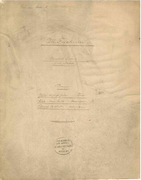Newly discovered autograph of the cantata "Die Fischerin" by Engelbert Humperdinck
Tuesday, April 9, 2019

An autograph manuscript by Engelbert Humperdinck (1854-1921) has been discovered in the library collections of the Universität der Künste in Berlin: the dramatic cantata Die Fischerin for three solo voices and orchestra with words by Johann Wolfgang von Goethe, which previously had only been known in fragments.
The autograph manuscript, which had been classified as an anonymous work, was identified as a complete score by Humperdinck when it was cataloged by RISM.
Humperdinck, best known for his fairy-tale operas Hänsel und Gretel and Königskinder, composed this cantata in 1880. He made this fair copy between 14 December 1880 and 1 January 1881 in order to submit it for the Meyerbeer Prize. His application was successful and he was able to travel to several Italian cities as well as to Paris for study visits. The composer was presumably not mentioned by name on the title page because it was used in a competition. Hans-Josef Irmen’s catalogue of works contains numerous references to letters by the composer from Xanten, where the cantata was written.
The autograph manuscript measures 33 x 25,8 cm (height x width) and has 68 pages, of which the first 66 contain writing.
The title reads:
| Die Fischerin. | Dramatische Cantate | für Soli und Orchester. | Personen: | Martin, ein junger Fischer. Tenor | Lisa, seine Braut. Mezzo-Sopran | Susanne, die Schenkin. Hoher Sopran. |
The newly discovered, complete version of the cantata allows us once more to analyze the works of Humperdinck and to acquaint ourselves with one further Goethe setting. It is surprising that the prologue of Goethe’s Die Fischerin, which in an excerpted form became famous as “Der Erlkönig,” was not used in Humperdinck’s setting.
A record for the cantata, with incipits, can be seen in the RISM catalog (RISM ID no. 1001053670).
Gottfried HEINZ-KRONBERGER, Munich, April 2019
gottfried.heinz-kronberger@bsb-muenchen.de
Share Tweet Email
Category: Rediscovered


